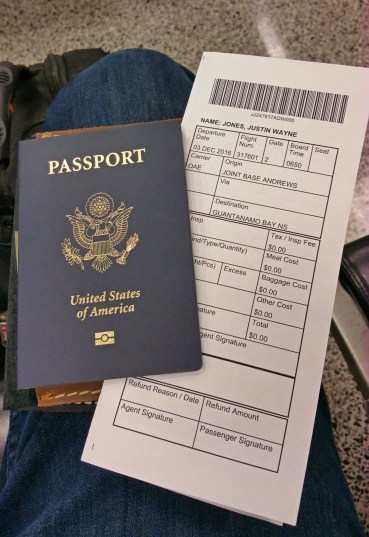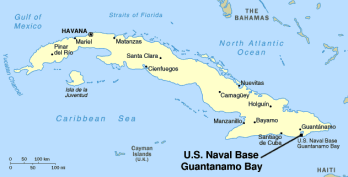I have been nominated and confirmed to monitor the 9/11 pre-trial hearings against the five alleged masterminds of the 9/11 attack on the World Trade Center and the Pentagon. The hearings are scheduled to take place at the Guantanamo Naval Station, at Guantanamo Bay, Cuba from December 5-9. I am participating as an affiliate of the Indiana University McKinney School of Law Program in International Human Rights Law (PIHRL), which is a non-governmental organization (NGO). You can see my previous blog posts regarding this mission here and here.
Arriving at Guantanamo Bay
I left Joint Base Andrews (JBA) at 8:00a on Saturday, December 3rd, my pre-departure blog post can be seen here. I flew over on a Boeing 767-200ER operated by Omni Air International. As an NGO observer, there was no cost to me for the flight. The flight was about half full and had approximately 110 passengers. I previously heard that the plane is usually divided into sections for different stakeholders. However, there was never any mention of sitting in a specific area and it appeared that everyone sat wherever they wanted to. It may have been different because the flight was so empty.
After arriving on base at about noon, the NGOs gathered in a group with our escort. There are eight NGO observers in my group, including myself. Our mission is to be the eyes and ears for the outside world. We are responsible for attending, observing, analyzing, critiquing, and reporting our experiences at the pre-trial hearings and Guantanamo Bay in general. We have an escort that helps us move around the base. Our escort also facilitates various needs that we have throughout our time at GTMO. The escort also ensures that we get to court and other places on time. This was our escort’s first time working as an NGO escort, although the escort has been to Guantanamo Bay multiple times.
After departing the plane, the NGOs went into a building where military personnel checked our passports and paperwork. The military personnel inspected our paperwork then sent us to a lobby in the building. Our escort made a phone call to see if we had a vehicle coming to pick us up. After about fifteen minutes, two vans arrived to take us and our luggage to Camp Justice. The main portion of the Naval Base is across Guantanamo Bay from the airport where the plane arrived. I, along with the other seven NGOs, were taken across Guantanamo Bay via ferry. It took about 20 minutes to get across Guantanamo Bay.
Arriving at Camp Justice After exiting the ferry, we were then driven to Camp Justice and had an opportunity to unpack and settle in. The accommodations have been surprisingly comfortable. We have had access to free internet (via Ethernet cord) in the MWR (morale, welfare, and recreation) tent, which is only 50 feet from the housing tents.
After exiting the ferry, we were then driven to Camp Justice and had an opportunity to unpack and settle in. The accommodations have been surprisingly comfortable. We have had access to free internet (via Ethernet cord) in the MWR (morale, welfare, and recreation) tent, which is only 50 feet from the housing tents.
After we settled into camp, we were taken to have our badges made. We also received a short briefing from the head of security. A lot of the discussion focused on where we were allowed to take pictures. Within the Expeditionary Legal Center (ELC), we were informed that we could only take pictures in three areas. The head of security provided us a map that showed the areas that we could take pictures. I folded the map and took it with me when we were finished with the security briefing. After I walked outside the head of security came out and told me that he needed the map back. Without the map it was unclear where pictures were allowed to be taken in the ELC. The general rule at GTMO is to not take any pictures of structures that are inside a fence. Some areas also have signs that say “no photography.”
Around the island
Since we arrived on Saturday, and hearings do not start until Monday, we had the weekend to explore the base with our escort. On Saturday, we had a meeting lined up with the defense team for al Baluchi. The meeting was a great opportunity to speak with the defense team in an informal setting. They were very candid in their responses, and they answered all of the questions asked. It was nice to get their perspective, but I will reserve any judgment until I have had an opportunity to listen to the prosecution and see the hearings this week.
On Sunday, we went on a driving tour of the base. We started by drivin g to Camp X-Ray. I had requested a foot tour of Camp X-Ray but our escort said that it takes at least a month to get approval to do a foot tour. We stopped on the road and were able to look at the camp. It was probably 150 yards from the road and was very overgrown with weeds and trees. We were not allowed to take photographs of Camp X-Ray. We were then taken to Windmill Hill, which provided excellent views of the island. We could also see the detention facilities from there. There were no pictures allowed there either. Next, we drove by Radio GTMO, which was closed. We then drove to Cable beach. Finally, we made our way back to Camp Justice.
g to Camp X-Ray. I had requested a foot tour of Camp X-Ray but our escort said that it takes at least a month to get approval to do a foot tour. We stopped on the road and were able to look at the camp. It was probably 150 yards from the road and was very overgrown with weeds and trees. We were not allowed to take photographs of Camp X-Ray. We were then taken to Windmill Hill, which provided excellent views of the island. We could also see the detention facilities from there. There were no pictures allowed there either. Next, we drove by Radio GTMO, which was closed. We then drove to Cable beach. Finally, we made our way back to Camp Justice.
A portion of our group then decided to go to the beach. We were informed that Girl Scout Beach would be the best beach for swimming. Hurricane

Justin at Girl Scout Beach
Matthew caused some damage to the stairs that lead down to the beach, but it had been repaired recently. The beach was nice but sandals or beach shoes would have been helpful because it is very rocky. The water temperature was great and the water was very clear.
Part of the group finished the day at O’Kelly’s Irish Pub and the other half of our group watched Hacksaw Ridge at the Lyceum outdoor movie theater. I was happy to see that the base had many of the same amenities as home, although, it often creates a strange dichotomy. One minute you are driving by a football field and McDonalds, then the next minute you are driving by buildings and tents surrounds by fencing and razor wire.
The base also had a lot of holiday activities and decorations. There was a Christmas parade on Sunday, with decorated floats. The NEX (similar to a supermarket) had a bunch of decorated Christmas trees outside. Near the marina, there was a very large decorated tree and a bunch of outdoor Christmas decorations. When we are traveling through the base, it very much felt like any other town.

Justin and two other NGOs.
I look forward to posting about the upcoming pre-trial hearings.


Justin at Girl Scout Beach

Iguana at Girl Scout Beach

Justin’s room at Camp Justice

Girl Scout Beach

Girl Scout Beach

Girl Scout Beach

Justin W. Jones (J.D. Candidate, ’18)
NGO Monitor, U.S. Military Commission Observation Project (MCOP)
Program in International Human Rights Law
Indiana University McKinney School of Law



 t Joint Base Andrews at 10:00 a.m. on Saturday, December 3rd. I plan to arrive at Guantanamo Bay from December 3rd until December 10th. Travel plans have frequently changed during other NGOs’ missions, so I am trying to book refundable tickets in case anything changes in the next week. I currently do not have any information on the type of plane or the estimated time of arrival in Guantanamo Bay.
t Joint Base Andrews at 10:00 a.m. on Saturday, December 3rd. I plan to arrive at Guantanamo Bay from December 3rd until December 10th. Travel plans have frequently changed during other NGOs’ missions, so I am trying to book refundable tickets in case anything changes in the next week. I currently do not have any information on the type of plane or the estimated time of arrival in Guantanamo Bay.






 ates District Court- Southern District of Indiana. I am honored to have been selected as an observer for the IU McKinney U.S. Military Commission Observation Project and look forward to contributing to the project. I am scheduled to monitor the hearing of Abd al-Rahim Hussein Muhammed Abdu al-Nashiri. My fellow IU McKinney classmate, David Frangos, has an excellent post on this blog discussing the upcoming al-Nashiri hearing (dated October 10, 2016).
ates District Court- Southern District of Indiana. I am honored to have been selected as an observer for the IU McKinney U.S. Military Commission Observation Project and look forward to contributing to the project. I am scheduled to monitor the hearing of Abd al-Rahim Hussein Muhammed Abdu al-Nashiri. My fellow IU McKinney classmate, David Frangos, has an excellent post on this blog discussing the upcoming al-Nashiri hearing (dated October 10, 2016). ts of the trip were Yellowstone National Park, Jackson Hole, the Badlands, and Mt. Rushmore.
ts of the trip were Yellowstone National Park, Jackson Hole, the Badlands, and Mt. Rushmore.